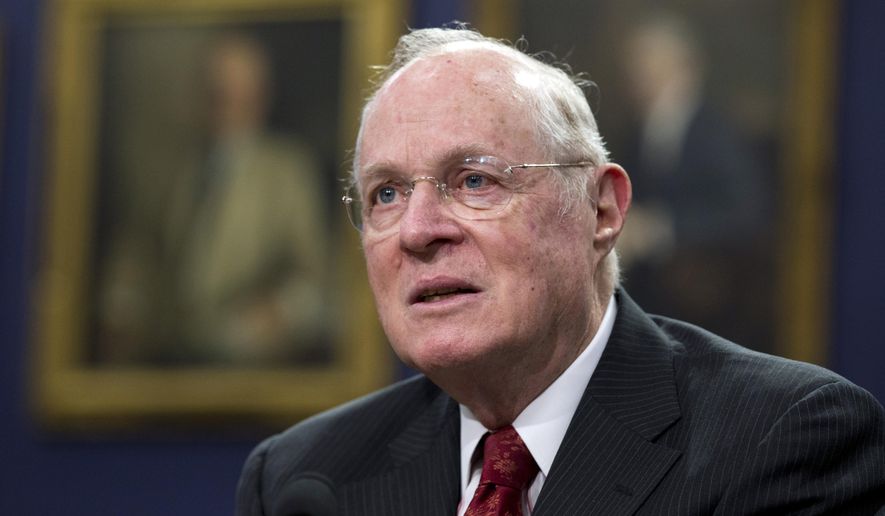OPINION:
In 1992 Supreme Court Justice Anthony Kennedy wrote, “At the heart of liberty is the right to define one’s own concept of existence, of meaning, of the universe and the mystery of human life.” And thus, the good judge, who became emblematic of what it means to “straddle the fence,” opened up Pandora’s box and released a curse of Herculean proportions on modern man:
Consider the week’s headlines.
Proponents of critical race theory double down in suggesting that people with paler skin are actually “less” human than “persons are of color.” Sociologists such as Kyle Myers and her husband Brent Courtney make national news for raising their child to choose “his” (or her?) own gender as early as age five. And, “Pride” marchers, including Vice President Kamala Harris and first gentleman Doug Emhoff, boldly strut our nation’s streets declaring that their sexual inclinations are one and the same as their human identity.
All of these stories have one thing in common. All of them are examples of doing precisely what Justice Kennedy told us all to do. All of them are tales of choosing to “define [our] own concept of existence” and deciding for ourselves what it means to “be” human.
This is the seminal issue of our time. This is the big question that drives all others — What does it mean to be a human being?
Are we morally culpable? Do we choose our actions? Do our appetites and desires define us? Can we and should we rise above our instincts and inclinations? Can we decide to behave differently? Are we defined by the color of our skin or the content of our character? Is there such a thing as an objective male and female? If we can’t get the answers to these questions right then, all else will be wrong in the wake that follows.
For some five thousand years, the Judeo/Christian tradition has affirmed that we are the imago Dei. We are made in the image of God (b’tselem Elohim). We are not the imago dog. We are not animals. This time-tested truth elevated mankind to an objective good like no other, and for centuries, it has stood in direct opposition to our hell-bent determination to diminish men and women to little more than products of intersectionality or the libidinous fantasies of those who would deem themselves the “fittest” to survive.
Are we merely products of the primordial ooze? Are we nothing but evolved beasts risen triumphantly from a Marxian swamp? Are we simply happenstance and chance? Do we have moral significance above that of a dog, a pig, a cat, a cow or even a virus? Are we somehow “different” than all the rest of what we see around us?
Why do we believe in justice? Why do we care about civil rights? Why are we indignant when we see something that we consider to be wrong? Do we not stand alone as the only beings that even care about tolerance, love, inclusion, equality and fairness?
Why do we think rape is wrong? Why should slavery be reviled? Why isn’t greed good? Why was the Holocaust a bad thing?
Do we still believe in science? Do we believe in biology? In physiology? In genetics? Is the human being an objective reality or a social construct?
The answers to all these questions serve as the necessary predicate for everything else.
Defining the human being is the starting point for all that follows. Failing at this “First Thing” only serves to impede any meaningful quest for justice, righteousness, meaning and individual and corporate happiness.
Getting these answers wrong is akin to lying to ourselves. M. Scott Peck calls it the “diabolical human mind.” Graham Walker calls it the “pathology of the intellect,” and St. Augustine warned us of … what he termed “fantastica fornicatio” — the prostitution of the mind.
The biggest deception of our time is the lie that slithered forth from Justice Kennedy’s Pandorian box in 1992. The idea that we can decide who we are, that we have the right to determine what it means to “be” human, and that we can define ourselves by our libido rather than our Lord is the “fantastica fornication” of the 21st century.
It is intellectual pornography. It is pedagogical poison. It is the sin that leads to all others: A “sin [that] probably ranks first … precisely because it opens the door to all other capital sins: pride, avarice, anger” and the “sloth” of “mental laziness.” (Peter D. Beaulieu). It is the “complete anti-God state of mind.” (C.S. Lewis). It is Pride, and it cometh before our fall.
“Because they exchanged the truth about God for a lie … God gave them up to a debased mind … They were filled with all manner of malice, envy, murder, strife, [and] deceit … They [were] … inventors of evil.” — St. Paul
• Everett Piper (dreverettpiper.com, @dreverettpiper), a columnist for The Washington Times, is a former university president and radio host. He is the author of “Not a Daycare: The Devastating Consequences of Abandoning Truth” (Regnery) and, most recently, “Grow Up: Life Isn’t Safe, But It’s Good” (Regnery, 2021).




Please read our comment policy before commenting.